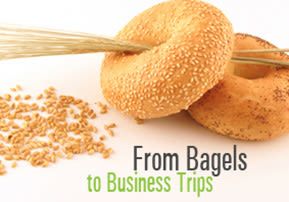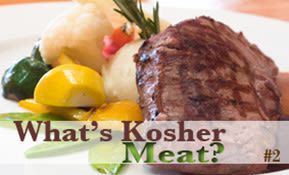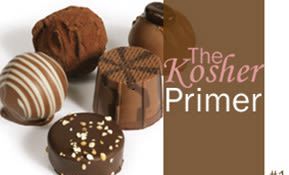
From Bagels to Business Trips
Many folks don’t understand what could possibly be unkosher about a loaf of bread. Just as Sara isn’t necessarily Jewish, a bagel isn’t necessarily kosher. Ask Rabbi Yaakov Luban.

The Kosher Primer, Part 4
11. Breads, Rolls, Challah, Bagels and Bialys:
These basic household staples present several kashrut problems and require kashrut certification.
Flour must be absolutely bug-free and carefully sifted under rabbinical supervision.
Many types of bread are made with oils and shortenings. Basic ingredients of specially prepared dough mixes and dough conditioners are shortenings and diglycerides. In bakeries, pans and troughs in which the dough is placed to rise and to bake are coated with grease or divider oils, which may be non-kosher. These oils often do not appear on the label. There may also be an issue of other non-kosher products prepared and baked on the same equipment. These are some of the reasons that bread requires kosher supervision.
It is Rabbinically prohibited to consume bread with dairy ingredients. Since bread is frequently eaten at all meals, the Rabbis were concerned that one might inadvertently eat dairy bread with a meat meal. There are two exceptions – if the bread is baked in an unusual shape or design indicating that it is dairy, or if the loaf is so small that it would be consumed at one meal.
Jewish law requires that a portion of batter or finished baked product be set aside for what is known as “challah”’. While any size portion is adequate for challah, it is customary to separate a portion the size of an olive. After separation, the challah is burned. This ritual is obligatory only when the owner of the dough at the time of its preparation is Jewish, and the dough is made from flour of any of the following five grains: wheat, oats, rye, spelt, and barley. In addition, there is no requirement to separate challah if the batter contains less than 2-1/2 pounds of flour. If the batter contains at least 5 pounds of flour, a blessing is recited before separating challah.
If this mitzvah has not been performed in the bakery, it may be performed in the home by placing all the baked goods in one room, breaking open all sealed packaged material, and taking a small piece from any of the baked goods and burning it.
12. Cake, Pastries and Doughnuts
These products generally contain shortening, emulsifiers, flavors and other kosher sensitive ingredients, and therefore reliable supervision is necessary.
13. Dairy Products
A. Milk:
Rabbinic law requires that there be supervision during the milking process to ensure that the source of the milk is from a kosher animal. Following the opinion of many rabbinic authorities, OU policy is that in the United States, the Department of Agriculture’s regulations and controls are sufficiently stringent to ensure that only cow’s milk is sold commercially. These government requirements fulfill the Rabbinical requirement for supervision. However, some individuals are more stringent and only consume milk that was produced with full-time supervision. This is known as cholov yisroel.
B. Cheese:
All cheeses require kashrus certification, including hard cheeses (Swiss, cheddar, etc.) and soft cheeses (cottage, farmer, pot, and cream cheese). Rennet, processed from the stomachs of unweaned calves, is often used in the production of hard cheese as a curdling and coagulating agent. Kosher hard cheese is produced with microbial rennet, which is derived from kosher sources. Because hard cheese is typically made with animal rennet, the Rabbinic sages decreed that even when animal rennet is not used, a full-time supervisor must be present to guarantee the kosher integrity of the product. Hard cheese produced with kosher ingredients and a full-time supervisor is known as gevinas yisroel.
Soft cheeses may contain cultures and flavors that are not kosher. Since these products are pasteurized, the kosher integrity of the equipment is an issue as well.
14. Pareve Foods:
The adjective ‘pareve’ means that the food item does not contain dairy or meat ingredients, and it was not processed with heat on dairy or meat equipment. Pareve foods are neutral and may be eaten with meat or dairy foods.
A. OU policy is that dairy or meat items are labeled OU-D and OU Dairy or OU Meat respectively. An item that is labeled OU without a suffix can be assumed to be pareve. Nonetheless, we recommend checking the ingredients listed on the label, since on rare occasions, the OU-D is inadvertently omitted.
B. Sherbets:
According to government standards, any product labeled ‘sherbet’ or ‘fruit sherbet’ must contain milk and is, therefore, not pareve. Water ices may be pareve or dairy, which will be reflected in the OU designation.
C. Margarine:
Margarine contains oils and glycerides and requires rabbinic certification. Margarine may contain up to 12% dairy ingredients, and some margarines are OU Dairy while others are pareve.
D. Many non-dairy creamers are, in fact, dairy and bear an OU-D. The government requires that creamers be labeled “non-dairy” if milk derivatives are used instead of whole milk.
15. Natural and Health Foods
With the proliferation of so-called “Natural” or “Pure” and similarly promoted health food products in the United States, some clarification is in order with regards to their kashrus status. There is a mistaken notion that natural products are inherently kosher. In fact, all non-kosher food items are natural, and therefore natural has no bearing on the kosher status.
16. Wines and Grape Products
All grape juice, grape wines or brandies must be prepared under strict Orthodox Rabbinic supervision. Once the kosher wine has been cooked, no restrictions are attached to its handling. Such products are generally labeled “mevushal”.
Grape jam (produced from grape pulp) as well as all varieties of jam and jelly require supervision because they may be processed on non-kosher equipment and may contain non-kosher additives.
Grape jelly is produced from grape juice and can be used only when produced from kosher grape juice under proper supervision.
Natural and artificial grape flavors may not be used unless they are kosher endorsed. Many grape flavors contain natural grape extracts and are labeled artificial or imitation because other flavoring additives are used in the formula.
Liqueurs require supervision because of the flavorings used in these products. In addition, the alcohol base may be wine derived.
17. Traveling Kosher
For the businessperson or tourist traveling across the United States, kosher certified products are available almost everywhere, even in the smallest groceries in the most remote towns. However, it is much more difficult to obtain reliably kosher certified products in most foreign countries.
A traveler bringing along frozen (T.V.) dinners where only non-kosher ovens are available for reheating, may use the ovens by covering the frozen package with two layers of aluminum foil. If a microwave will be utilized, then the food must also be double wrapped. Kosher meals should be ordered in advance when traveling by plane, train or ship. These meals are also heated in non-kosher ovens. The employees of the carrier are instructed to heat these meals in the same manner that they were received; totally wrapped in double foil with the caterer’s seal and the Rabbinic certification seal intact. The traveler can ascertain by the intact seals that the dinners have not been tampered. Any dinner, which is not properly sealed, should not be eaten. The kosher certification only applies to the food in the sealed package.
Any other food (rolls, wines or liqueurs, cheeses, and coffee creamers or snacks) served loose by the carrier is not included in the kosher endorsement, unless it is sealed and bears its own separate endorsement.
(Reprinted with permission of http://www.ou.org/)










Tell us what you think!
Thank you for your comment!
It will be published after approval by the Editor.